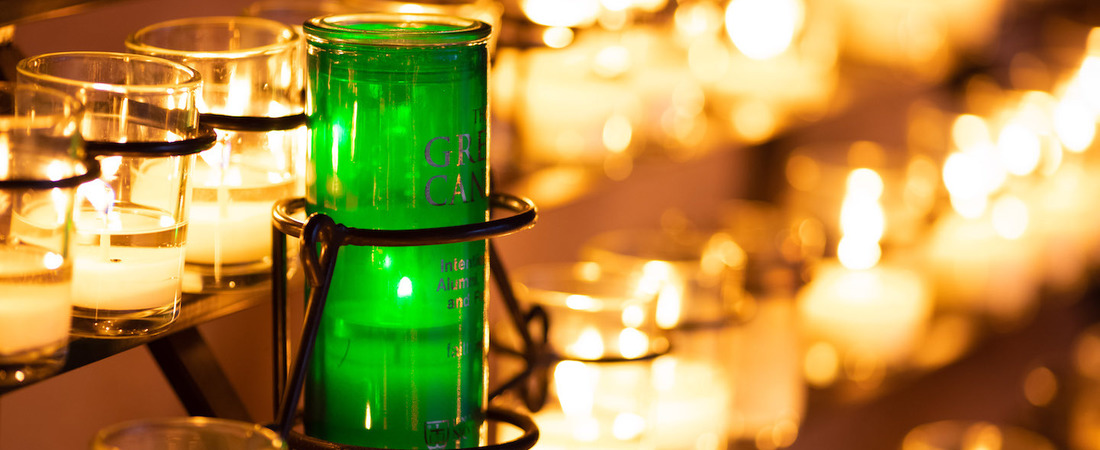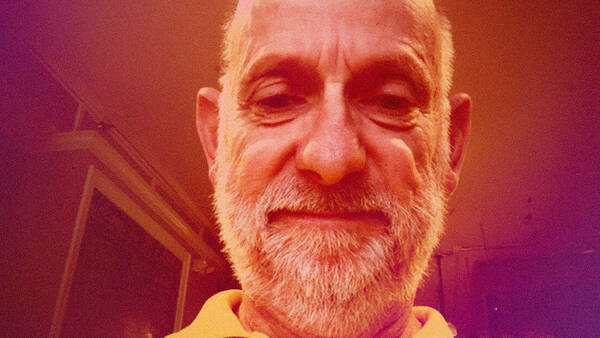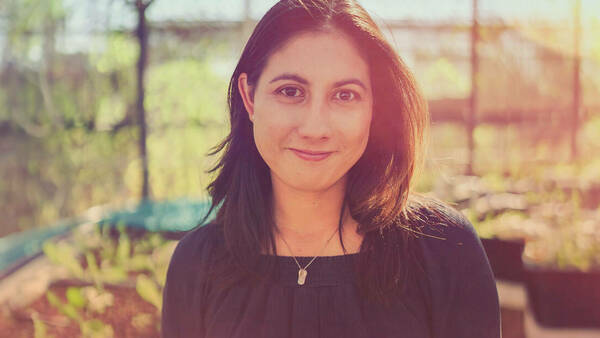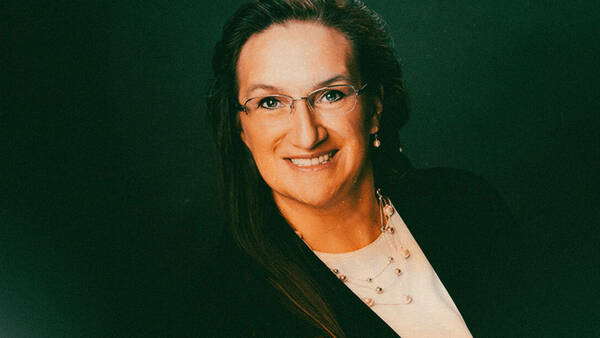Notre Dame alumni, parents, and friends continue to be forces for good in the fight to end the COVID-19 pandemic and support the vulnerable during this challenging moment in time.
Below is Volume 4 of stories from across the ND family. Read Volume 1, Volume 2, and Volume 3, for more stories of the ND family over the past several weeks.
Greg Bercaw ’13 M.A. helps to manage business operations at a distillery now making hand sanitizer.
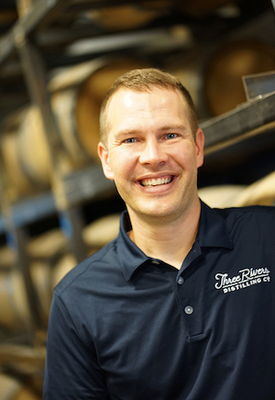
What is your connection to Notre Dame?
I graduated with a M.A. in Theology in 2013. At that time I was teaching theology in the Diocese of Fort Wayne-South Bend. I currently serve on the Notre Dame Club of Fort Wayne board.
How is your work impacting the fight against COVID-19?
Once the stay-at-home orders started, Three Rivers Distilling Co. shifted gears to start using our production equipment to fill the demand for hand sanitizer. We started a GoFundMe page to fund production and spent a lot of time figuring out how to produce sanitizer in compliance with the FDA and WHO. Currently, we have donated over 1,700 gallons of sanitizer to first responders, nursing homes, hospitals, and over 500 other essential businesses. We hope to be able to give something to everyone who has put in a request in the greater Fort Wayne area, which will require producing another 6,000 gallons. I am lucky to be able to sit at my desk in my home office to contribute to our effort. The team that heads into the distillery every day to produce and distribute the sanitizer to those in our community deserve the most credit.
How did Notre Dame influence your career path?
After teaching in the Diocese of Fort Wayne-South Bend for 14 years, I made a major career change in 2017. I joined an upstart distillery in Fort Wayne and have been helping to manage operations since 2018. The Catholic mission of Notre Dame has always been at the heart of whom I try to be and I hope that shines through, whether I be teaching in a classroom, in the way I conduct business now at Three Rivers Distilling Company, or in whatever the future holds for me.
What message would you like to share with your Notre Dame family?
“You do not need to know precisely what is happening, or exactly where it is all going. What you need is to recognize the possibilities and challenges offered by the present moment, and to embrace them with courage, faith, and hope.” ― Thomas Merton
Rene Bermea, M.D. ’12 is a critical care physician taking care of some of Boston’s sickest patients with COVID-19 in the intensive care unit.
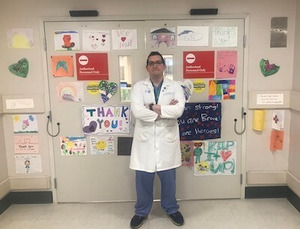
What is your connection to Notre Dame?
I graduated from Notre Dame in 2012 after double majoring in biochemistry and philosophy. I’m also a proud Knott Hall Juggernaut.
How is your work impacting the fight against COVID-19?
I’m a physician currently working in the medical intensive care unit at the Massachusetts General Hospital where I take care of some of Boston’s sickest patients with COVID-19. These include those who require mechanical ventilation and ECMO (extracorporeal membrane oxygenation), which essentially serves as an artificial lung. I have the privilege of working with outstanding resident physicians, nurses, respiratory therapists, and pharmacists. My fellow healthcare workers and I are saving lives each and every day in the ICU.
I’m currently undergoing subspecialty training within the Harvard combined pulmonary and critical care fellowship at MGH and Beth Israel Deaconess Medical Center in Boston. I plan on specializing further in lung transplantation medicine and conducting research in transplant immunology and mechanisms of organ rejection.
How did Notre Dame influence your career path?
It’s safe to say that without Notre Dame, I wouldn’t be where I am today. I was an 8-year-old boy growing up in a rural border town in southwest Texas with two dreams: 1) become a doctor and 2) go to Notre Dame. Back then those goals seemed so far away, but they were closer than I could have ever imagined.
My training in biochemistry laid the groundwork for the scientific building blocks required to practice medicine and interpret medical literature. Research opportunities fueled my desire for a career in science. My study of philosophy showed me how to think critically and formulate arguments, which are essential in academic medicine. But most importantly, Notre Dame instilled into me, as she does for all of her alumni, the value of helping others and a concern for the common good.
What message would you like to share with your Notre Dame family?
St. Thomas Aquinas, one of the most influential philosophers of the medieval period, stated that there exist four cardinal virtues: Prudence, Temperance, Justice, and Courage. So during this pandemic, let us heed his words: may we have the Prudence to conduct sound science and seek the truth behind this disease; may we have the Temperance to not put others in harm’s way (social distancing!); may we exercise Justice in caring for everyone equally across the world during their times of need; and for all of the essential workers who are risking their lives every day – may we have the Courage to continue to fight this terrible virus on behalf of our fellow brothers and sisters.
Go Irish!
Robert A. Fiala ’76 is the mayor and safety director for the city of Willoughby, Ohio, and a founding partner at TDA Architecture.
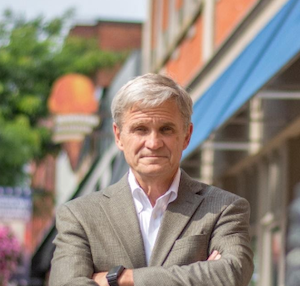
What is your connection to Notre Dame?
I am a proud 1976 graduate with a Bachelor of Architecture degree and honored to have been on the Dean’s list all five years. As a resident of Cavanaugh Hall, I was active in interhall sports. Fellow Notre Dame/Cavanaugh alumni and I still rendezvous yearly to celebrate our sports teams.
How is your work impacting the fight against COVID-19?
As mayor and safety director for the city of Willoughby, Ohio, and a member of the Northern Ohio Area Coordinating Agency (NOACA), a regional council of governments, our daily efforts focus on supporting and executing our governor’s directives. Our efforts include working to reduce the peak of the COVID-19 pandemic. Efforts thus far have included working with our community in maintaining social separation. In a city of 23,000 residents northeast of Cleveland with a small historic downtown, our local merchants and restaurants are in a desperate struggle for survival. We coordinate with other communities and our county health district to ensure our first responders and healthcare workers have the tools they need to fight the virus. We are also committed to finding creative ways to help our businesses survive this crisis. We are working to understand how the pandemic will affect the future of small local enterprises when we return to normalcy. The pandemic also requires we comfort our families, friends, neighbors, and communities by assuring them that we can endure the COVID-19 crisis. Our goal is to instill hope that our recovery will provide new opportunities.
In my architectural practice, which focuses on K-12 educational facilities design, we are developing the tools and techniques being used in virtual teaching/learning as we begin to understand how this may shape the future of education.
How did Notre Dame influence your career path?
The design and technical training in architecture and liberal arts coursework, including philosophy, have helped develop leadership skills that include honesty/integrity, empathy, and accountability, among others. These are essential tools to cope with a worldwide pandemic that has become local. Notre Dame has taught me that in a continually changing world, core values can remain unchanged just as Notre Dame’s mission has for almost 200 years.
What message would you like to share with your Notre Dame family?
Notre Dame has done a magnificent job of maintaining its vision through the generations. Today, as in my graduation year of 1976, the University still represents its founding moral principles. This steadfast approach provides comfort and a sense of stability in such uncertain times.
Alex Torres Fung ’03 helped launch Upparent, a website for sharing activities, recipes, and parenting tips.
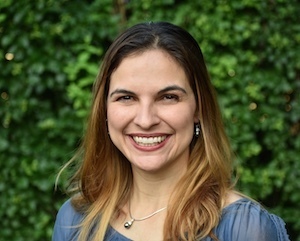
What is your connection to Notre Dame?
I graduated from Notre Dame in 2003, along with my husband and some of my very best friends in the world. I was a proud resident of Lyons Hall, spent my junior year studying abroad in Angers, France, and graduated with a B.A. in Political Science, French, and Theology. My sister is also an ND grad, and I hope at least one of our four kids (all baptized at the Log Chapel) will follow in their parents’ footsteps once they are ready for college!
How is your work impacting the fight against COVID-19?
My ND roommate Kelly Rogers Rupiper ’03 and I have been working together to launch Upparent, a website for parents to browse and share recommendations about family activities, recipes, toys, and other parenting tips. As all of us are called to practice social distancing to help slow the spread of COVID-19, we’ve been focusing on creating resources for fun, practical, and educational activities for kids and families at home. Our COVID-19 Family Guide contains hundreds of parent-submitted ideas for indoor activities for kids, including a calendar of the many free virtual events being offered by artists, authors, and businesses around the country, and hands-on learning opportunities like our list of easy science experiments. We hope these resources can help make things just a little bit easier for parents, many of whom are now juggling working from home while also caring for and teaching their children, often without the family and community support systems they might typically rely on.
How did Notre Dame influence your career path?
Notre Dame is a special place. The people I met, the classes I took, and the activities I participated in all helped me to grow in my Catholic faith, underscoring the values of community and service to others. I attended law school with the goal of going into public interest work and served as an advocate for children and families in the nonprofit sector for many years. The opportunity to launch Upparent was an exciting and unexpected turn on this career path, but one I was also drawn to for the chance it offers to create community and support families in new and innovative ways.
What message would you like to share with your Notre Dame family?
Take care of yourselves and one another, and if possible, stay connected to your communities however you can. Most of all, THANK YOU to those healthcare workers, first responders, and other heroes in our family who are on the front lines of this pandemic taking care of all of us!
Rebecca Ayala Goett, M.D. ’05 is a doctor in emergency medicine, hospice, and palliative medicine at a hospital in Newark, New Jersey.
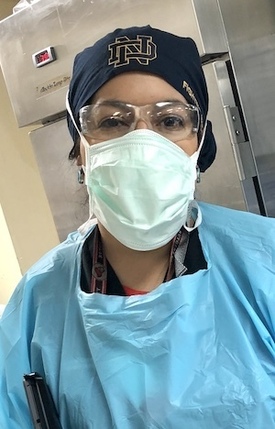
What is your connection to Notre Dame?
I am Rebecca Goett (formerly Ayala) ND alumni class of 2005. I lived in PW and my husband David Goett lived in Alumni Hall and also graduated in 2005. I graduated pre-med, but was a mathematics major until junior year. I studied socialized medicine in London and fell in love with medicine. (I hope that class is still given; it helped shape my career path.)
How is your work impacting the fight against COVID-19?
I work in the emergency department in the large public hospital in Newark, which serves the underserved population of Newark. It can be a hard place to work because of the lack of resources that are available to our patients, but also a deeply fulfilling one. My co-workers and I are often people who came from similar communities so we see our jobs as an attempt to serve the communities from which we came. I was blessed to have Notre Dame assist in my education so I can do this career. Now being in Newark, at one of the hardest-hit hospitals in New Jersey during the COVID pandemic, it is my duty to serve. Currently, when I am on in the emergency department, the volume, acuity, and need are overwhelming. I hope somehow I am making a difference for my patients.
How did Notre Dame influence your career path?
Notre Dame enforced my sense of service and charity. It is hard work, but it is the work I signed up to do. It is my duty to serve my patients.
What message would you like to share with your Notre Dame family?
Notre Dame helped prepare me for these moments. Thank you. Please continue to fight for us who are fighting for our patients.
Larissa Nez '19 has been working seven days a week, 11 hours a day at the Navajo Nation Emergency Operations Center (EOC) under FEMA as the Chief Operations Manager.
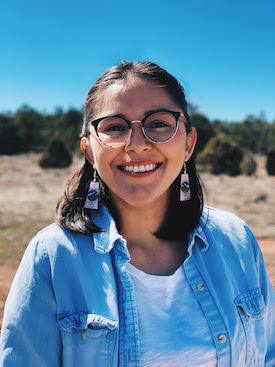
What is your connection to Notre Dame?
I graduated from the College of Arts and Letters in 2019, earning my BA in Art History with a minor in Sociology. I was actively involved with the Native American Student Association of Notre Dame (NASAND) and the Art History Club of Notre Dame. I also maintained active memberships with the American Public Health Association (APHA) and the College Art Association (CAA).
During my senior year, I was employed with the Snite Museum of Art and assisted in curating the exhibition, Revisions: Native Contemporary Art. This exhibition highlighted the ways in which contemporary Native artists address the politics of Indigenous identity and representation through their repurposing and reuse of objects, images, and texts found in tribal archives and popular culture.
This exhibition was extremely important for many reasons. First, it was the first exhibition solely dedicated to Native American contemporary artists. We displayed works from local Potawatomi artists as well as artworks from nationally recognized artists such as, Edgar Heap-of-Birds, Jaune Quick-to-See-Smith, Jeffrey Gibson, and Wendy Red Star. Second, this exhibition opened a month after President Jenkins decided to remove the controversial Columbus Murals from view in the Main Building.
As a Diné woman, I was delighted to contribute my ideas to the exhibition, but what I most enjoyed was putting my experience with activism to use at Notre Dame. Challenging my peers to acknowledge the mistreatment of Native people is one step and building allyship among our Notre Dame family is another. When non-Natives come into this work as accomplices, it becomes a deeply meaningful experience and can have powerful repercussions across time and space. In retrospect, the questions I asked, the ideas I explored, and the work I produced as a result of this exhibition led me to my research and professional interests today.
How is your work impacting the fight against COVID-19?
I am interested in furthering the study of cultural heritage and language revitalization as positive determinants of health in Indigenous communities. Exploring the inextricable connections between health, wellness, culture, community, and equity is deeply empowering for me. On a deeper and more challenging level, I also have a responsibility to critically analyze settler-colonialism which not only impacts Native peoples’ ability to learn their language or practice their culture, it also perpetuates racialized health disparities. My research interests couldn’t be more relevant during this pandemic. Indigenous nations across the world are being forced to grapple with the reality that the health of their people has been, and will be, deeply impacted by COVID-19. In the U.S., special circumstances influence federal-tribal relations.
Between the 16th and 19th century, the federal government, using powers granted by the Constitution, entered into more than three hundred treaties with tribal nations. As a result, federal-tribal relationships exist as a trustee-beneficiary status. Over five hundred federally-recognized tribes have treaty rights to federal health care services delivered through the Indian Health Care System (I.H.S.). Although the United States has a duty to provide these services, the I.H.S. is severely short-staffed, mismanaged, underfunded, and poorly equipped. As a result, the health status of tribal nations and communities suffers along with it. These systemic issues have been greatly exasperated during the COVID-19 pandemic.
The virulence of the virus is extremely concerning, especially when you consider the size, socioeconomics, health status, infrastructure, and various demographics about the Navajo Nation. In addition to this, health care facilities on the Navajo Nation don’t have access to or have run out of COVID-19 testing kits; they’ve reached capacity for critical care patients; they've run out of PPEs and disinfectant supplies; they’re burning through staff, and so forth. The failings, shortcomings, and gaps in the Indian Health System have become more apparent than ever before. In spite of this, Navajo communities remain resilient and hopeful. The Navajo Wellness Model (Shábik’ehgo As’ah Oodááł) uses traditional Diné knowledge, practices, and culture as the framework to attain and maintain our holistic health and wellbeing. Using this model, Navajo public health officials and (western and traditional) health practitioners have adapted recommendations, and guidelines from the CDC and WHO to be culturally tailored and specific to Navajo communities. In the Navajo Nation, there’s a deep-seated belief that Diné foundational teachings are just as important as western medicine in defeating COVID-19. The evolution and adaptation of Diné culture, language, and beliefs is a protective factor that has contributed to our resilience and survival. By incorporating the Navajo Wellness Model into health prevention, promotion, and research, Diné people are strengthened, empowered, and protected.
How did Notre Dame influence your career path?
My Diné culture, values, and worldview, combined with my education from Notre Dame, created the perfect foundation for me to continue this work. I believe that every academic institution that occupies stolen Indigenous land should be committed to confronting racism, inequity, and oppression across our social, cultural, and political spheres. At Notre Dame, I felt that I was part of this work through my involvement with the Center for Social Concerns and my participation in events at the Kroc Institute for Peace Studies. My faith, fortitude, and perseverance were greatly challenged at Notre Dame and I believe that I wouldn’t be the person I am today without Our Lady.
Notre Dame is a truly inspiring place and the friends, colleagues, and faculty members who supported my educational journey and career path have all been influential in their own unique ways. In the Fall of 2019, I was honored to join the Native American Alumni Board of Notre Dame. Our board connects with prospective and current students, alumni, and faculty who wish to learn about Native issues at Notre Dame and beyond. We are advocates, in our own right, for diversity, equity, and inclusion at Notre Dame.
What message would you like to share with your Notre Dame family?
Our Notre Dame family stretches across the globe. Each of us has a responsibility to develop to act as changemakers, caretakers, and storytellers. We each have our own story to tell; your story will depend on the choices you make today and how that choice will impact future generations. During this health crisis, I hope you continue to look out for your loved ones while also fighting for the health and well-being of marginalized communities. We are ND.
Additional Domers Doing Good
Brett Galley, M.D., ’97
In addition to his work as Medical Director of the Neonatal ICU at Christ Hospital (Oak Lawn), Brett is doing tremendous work to help Chicagoans experiencing homelessness at a time when they are most vulnerable. Brett is a member of the Board of Directors of Franciscan Outreach, which operates three homeless shelters in Chicago. Since the pandemic started, Brett and his wife, Kate ’97 S.M.C., have organized a virtual fundraiser (Hope for the Homeless) raising thousands of dollars for Chicago's most vulnerable, helping to offset the additional expenses incurred due to the pandemic. These expenses include the costs of transitioning the shelters to 24-hour operation and intensifying sanitation processes. He is also currently collecting masks to distribute to the guests and staff at Franciscan Outreach.
Derek Novacek, Ph.D., ’13
Derek is a postdoctoral fellow in clinical psychology at the Veterans Affairs Greater Los Angeles Healthcare System and the UCLA David Geffen School of Medicine. He is part of a research team that is examining the mental health consequences of the COVID-19 pandemic on vulnerable populations including individuals with serious mental illness, those who have recently experienced homelessness, and those who are socially disconnected. He will also soon be providing mental health support to frontline healthcare workers who are fighting COVID-19.
